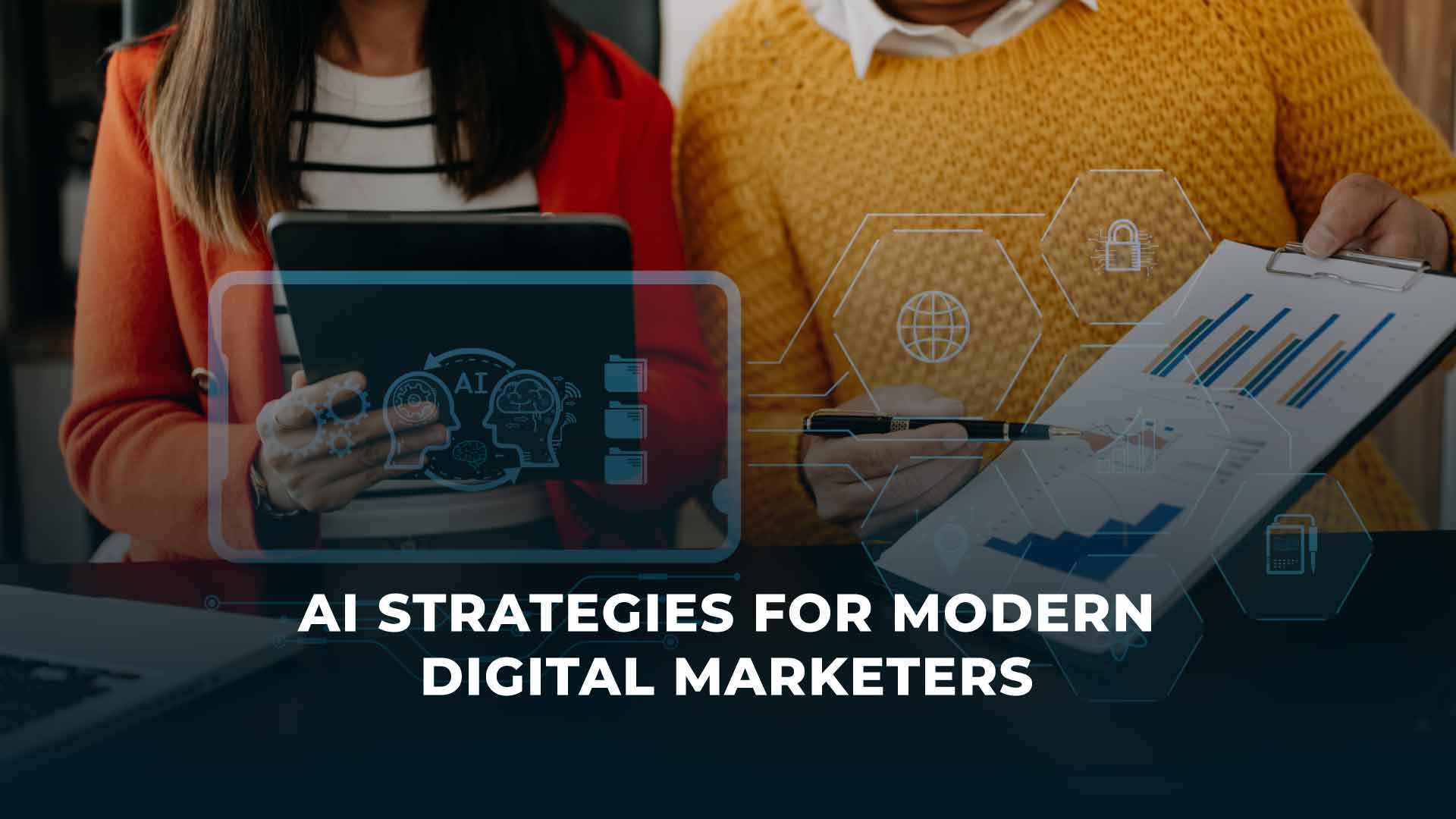AI Strategies for Modern Digital Marketers.
Amidst the swift progress of technology, artificial intelligence (AI) stands out as a pivotal force reshaping diverse industries. Among these, digital marketing has experienced a profound metamorphosis due to the influence of AI. Tools and techniques driven by AI have fundamentally altered the approach businesses take towards their marketing strategies. This transformation presents unprecedented opportunities while concurrently posing distinctive challenges. In this piece, we examine the impact of artificial intelligence on contemporary digital marketing, delving into the myriad opportunities it introduces alongside the substantial challenges that marketers are compelled to address.
Quick Links
What is Modern Digital Marketing?
Modern digital marketing refers to the contemporary practices and strategies employed by businesses and marketers to promote products or services using digital channels and technologies. It encompasses a wide range of online platforms, tools, and tactics aimed at reaching and engaging target audiences in a digital environment.
AI strategies for Modern Digital Marketers
AI strategies for modern digital marketers encompass a range of techniques and technologies that leverage artificial intelligence to enhance various aspects of marketing. Here’s a detailed explanation of key AI strategies for digital marketers:
- Customer Segmentation and Personalization
Explanation: AI enables marketers to analyze vast datasets and identify distinct customer segments based on demographics, behavior, and preferences. By understanding these segments, marketers can create personalized marketing campaigns tailored to specific audience groups.
Implementation: Use machine learning algorithms to analyze customer data, identify patterns, and categorize customers into segments. Tailor marketing messages, content, and promotions to address the unique needs and preferences of each segment.
- Predictive Analytics for Consumer Behavior
Explanation: AI-driven predictive analytics allows marketers to forecast consumer behavior and trends. By analyzing historical data and patterns, marketers can anticipate future actions and adjust strategies accordingly.
Implementation: Implement machine learning models to analyze historical customer data, website interactions, and purchase patterns. Use the insights gained to predict future trends and adjust marketing strategies proactively.
- Chatbots and Virtual Assistants
Explanation: AI-powered chatbots and virtual assistants automate customer interactions, providing instant support and guidance. This improves user experience by addressing queries promptly and offering assistance throughout the customer journey.
Implementation: Integrate chatbots with websites, social media, and messaging platforms. Train chatbots to understand and respond to customer queries, provide product recommendations, and guide users through transactions.
- Content Creation and Optimization
Explanation: AI tools streamline content creation processes by automating writing, image recognition, and optimization for search engines. This helps marketers produce high-quality, relevant content more efficiently.
Implementation: Use natural language processing (NLP) algorithms to generate content, employ image recognition tools to select engaging visuals, and leverage AI-driven SEO insights to optimize content for search engines.
- Dynamic Pricing Strategies
Explanation: AI facilitates dynamic pricing by considering real-time market conditions, competitor pricing, and consumer demand. Marketers can adjust prices dynamically to maximize revenue and respond to market fluctuations.
Implementation: Implement machine learning algorithms that analyze market dynamics, competitor pricing, and consumer behavior. Use this information to set prices dynamically, offering discounts during low-demand periods and adjusting pricing during high-demand phases.
- Sentiment Analysis in Social Media
Explanation: AI-driven sentiment analysis tools monitor social media platforms to gauge public sentiment toward a brand. This allows marketers to respond effectively to positive or negative sentiment, contributing to reputation management.
Implementation: Use machine learning models to analyze social media mentions and comments, categorizing sentiment as positive, negative, or neutral. Develop strategies to address negative sentiment promptly and amplify positive sentiment.
- AI-Powered Ad Campaigns
Explanation: AI enhances the efficiency of advertising campaigns by optimizing ad targeting, retargeting, and budget allocation. Marketers can use AI to analyze user behavior and deliver personalized advertisements, improving overall campaign effectiveness.
Implementation: Employ machine learning algorithms to analyze user data, preferences, and interactions. Use this information to target specific audience segments with personalized ads, and optimize ad spend based on performance metrics.
- Marketing Analytics and ROI Measurement
Explanation: AI-based analytics platforms provide deeper insights into the performance of various marketing channels. Marketers can measure the return on investment (ROI) more accurately and make data-driven decisions for continual refinement of marketing strategies.
Implementation: Implement AI-powered analytics tools to track and analyze key performance indicators (KPIs) across marketing channels. Use machine learning algorithms to identify trends, assess the impact of campaigns, and allocate resources effectively for optimal ROI.
- Predictive Lead Scoring
Explanation: AI-driven predictive lead scoring helps marketers prioritize and qualify leads based on their likelihood to convert. By analyzing historical data on successful conversions, machine learning models can identify patterns and characteristics indicative of high-converting leads.
Implementation: Implement machine learning algorithms to analyze past lead data, considering factors such as demographics, behavior, and interactions. Assign predictive scores to leads, allowing marketing teams to focus their efforts on leads with the highest likelihood of conversion.
- Automated A/B Testing and Optimization
Explanation: AI automates the A/B testing process, allowing marketers to test multiple variations of content, design, or campaigns simultaneously. Machine learning algorithms analyze the performance data in real time and optimize the elements for maximum effectiveness.
Implementation: Use AI-powered tools to set up and monitor A/B tests automatically. Allow machine learning algorithms to analyze the performance metrics and adjust campaign elements dynamically to achieve better results, saving time and resources for marketers.
Future of AI strategies in digital marketing
In the future, AI strategies are poised to revolutionize digital marketing by fundamentally altering the way brands engage with consumers. Advanced personalization driven by AI algorithms will enable hyper-targeted content and experiences, elevating customer engagement and satisfaction. Predictive analytics will empower marketers to anticipate and map the entire customer journey, allowing for proactive and personalized interactions at every touchpoint. AI’s role in voice and visual search optimization will reshape SEO practices, while the evolution of conversational AI and sophisticated chatbots will provide human-like interactions, transforming customer support and lead generation. AI-generated creativity will introduce novel approaches to content creation, and real-time decision-making fueled by AI will enable dynamic adjustments to marketing strategies based on current market conditions. Additionally, ethical AI practices will become paramount for maintaining consumer trust, and the integration of AI with augmented reality and virtual reality will offer immersive brand experiences. Overall, the future of AI in digital marketing holds the promise of unparalleled personalization, efficiency, and adaptability, reshaping the landscape of consumer-brand interactions.
Author’s Bio:
With Ciente, business leaders stay abreast of tech news and market insights that help them level up now,
Technology spending is increasing, but so is buyer’s remorse. We are here to change that. Founded on truth, accuracy, and tech prowess, Ciente is your go-to periodical for effective decision-making.
Our comprehensive editorial coverage, market analysis, and tech insights empower you to make smarter decisions to fuel growth and innovation across your enterprise.
Let us help you navigate the rapidly evolving world of technology and turn it to your advantage.
Why WooCommerce is the Best Choice for Your Online Store?
WooCommerce stands out as a top option for anyone looking to build an online store. This platform…
0 Comments8 Minutes
How to Use AI-Powered SEO Tools for WordPress eCommerce
SEO is a critical factor in the success of any e-commerce WordPress store. As competition…
0 Comments11 Minutes
Why Short-Form Videos Are the Future of Content Marketing
Your Instagram customers spend over 50% of their time watching short-form videos and reels. Rather…
0 Comments12 Minutes
The Role of Digital Marketing in Business Growth
Online marketing touches every aspect of a business, whether it is initiating the idea or for an…
0 Comments3 Minutes
AI Meets Authenticity: Balancing Automation and Human Touch in Content Marketing
Is your brand starting to sound like a robot? In a world where algorithms write faster than any…
0 Comments8 Minutes
Essential Tools for Enhancing Web Design and UX Hosting
Have you ever visited a website that felt slow, clunky, or confusing? A website that is poorly…
0 Comments11 Minutes
How a Mini Cart Transformed My Store’s Shopping Experience
Okay, real talk—running an online store is hard. You think you’ve got everything figured out, you…
0 Comments9 Minutes
Balancing Your Security Initiatives With Industry Compliance Requirements
Managing a business today comes with a number of daily battles that need to be fought. Resources…
0 Comments11 Minutes








